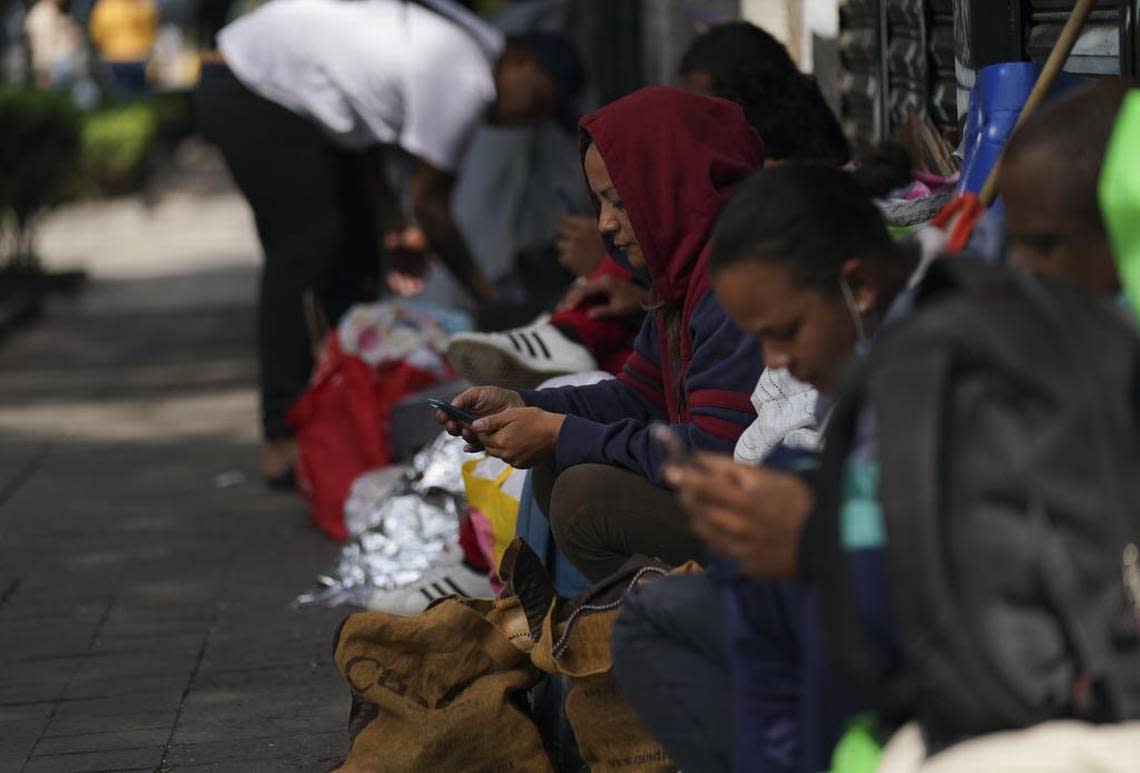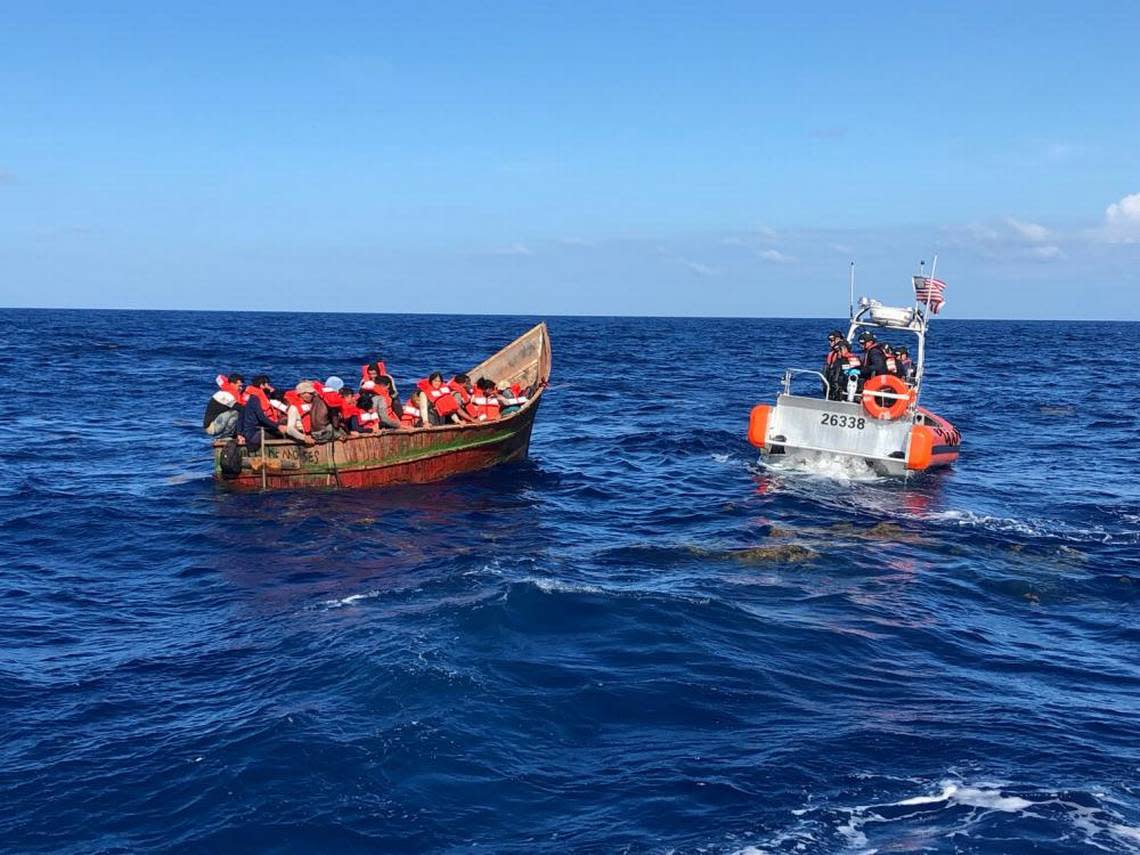New program for Cuban, Haitian and Nicaraguan migrants is complex. What you need to know
The Biden administration announced Thursday it will sharply step up the expulsion of migrants from Cuba, Nicaragua and Haiti who show up illegally at the U.S.-Mexico border. The administration also unveiled a new program to allow as many as 30,000 migrants a month from those countries to live and work in the U.S.
If they want to immigrate legally, migrants from the three countries — as well as Venezuelans, for whom there’s been a similar program in place since October — need to have an eligible sponsor in the United States willing to provide financial, housing and medical support. Both the migrants and their sponsors will need to pass background checks.
Qualified beneficiaries with an unexpired passport valid for international travel may be considered, on a case-by-case basis, for advanced authorization to travel and a temporary period of parole for up to two years for urgent humanitarian reasons or significant public benefit. The process will be totally online and under the parole program, Customs and Border Patrol will provide authorization to travel and beneficiaries will have to arrange and fund their own travel within 90 days. They will need to fly to the U.S. by air to their final destination.
For now, a totally online process is being implemented and will also include downloading a Customs and Border Patrol app. The app will allow migrants to schedule a time to come to a port of entry in the U.S. to seek an exception from being deported back to Mexico or to their home country under the Title 42 public health regulation, and it will also be used for those seeking to be paroled into the U.S. under the new process for Cubans, Haitians, Nicaraguans and Venezuelans.
For example, after confirming biographical information in their online account and completing required eligibility attestations for the parole program, the beneficiary will receive instructions through myUSCIS on how to access the CBP One mobile application. The beneficiary then must enter their biographic information into CBP One and provide a photo. After completing this step, the beneficiary will receive a notice in their online account confirming whether CBP will, in its discretion, provide them with advance authorization to travel to the United States to seek a discretionary grant of parole.

The Department of Homeland Security said it will publish a new rule that will require migrants who are on their way to the U.S. to first apply for asylum in a third country before reaching the U.S. border. Anyone who fails to do so would be barred from seeking asylum in the U.S. (Immigration advocates have criticized the proposal, saying that it is similar to former President Donald Trump’s “transit ban” for immigrants, which was blocked by a federal appeals court in 2020.)
Migrants who arrive at the U.S.-Mexico border, or at Florida’s coast, without getting advanced authorization face being expelled back to their countries or Mexico.
It is unclear how Cubans who arrive by boat in the Florida Keys would be expelled absent an accord with the Cuban government to take migrants back. For now, Cubans are being issued an “expedited order of removal,” which advocates say is “irregular” because it means the migrants did not have the opportunity to show they have a credible fear of persecution if they are returned to Cuba.
Haitians who arrive in the Florida Keys and the U.S. territory of Puerto Rico have also been returned to Haiti if they did not touch land. Those who have jumped off boats have been processed into the U.S., but it is still unclear how the new policy will affect them should they make it to land, like a recent boatload did on Tuesday in Key Largo.
Here’s what you need to know about the new measures:
How a migrant seek an exception from deportation under Title 42 public health:
Migrants seeking exception based on their vulnerability to persecution will need to download the free CBP One mobile application to schedule appointments to present themselves at a port of entry to facilitate their safe and orderly arrival. The CBP One application is available in the Apple and Google App Stores as well as at https://www.cbp.gov/about/mobile-apps-directory/cbpone.
Does a migrant need to be at the border to schedule an appointment?
No. The CBP One mobile app’s access has been expanded into Central Mexico in order to discourage migrants from congregating near the U.S.-Mexico border in unsafe conditions.
Ports of entry where migrants will need to show up once they have an appointment:
▪ Arizona: Nogales
▪ Texas: Brownsville, Hidalgo, Laredo, Eagle Pass, and El Paso
▪ California: Calexico and San Ysidro
What happens if a migrant tries to enter the U.S. without authorization?
Individuals will either be returned to Mexico, which has agreed to accept 30,000 individuals a month, or back to their home country.
What about those migrants who cannot be expelled under the Trump-era public health rule known as Title 42, which has been used to quickly expel thousands of Haitians at the southern U.S. border?
They will be deported under another statute known as Title 8 that allows for long-term bans from reentering the United States. Such migrants, including Haitians arriving at the Florida coast, could find themselves deported at the end of this process after failing to pass a so-called credible-fear interview with an asylum officer.
What happens if a migrant is removed under Title 8 statute?
The migrant faces a five-year ban on admission to the U.S. and possible criminal charges should they seek to reenter the United States.
What is the process for applying for the new parole program for Cubans, Haitians, Nicaraguans and Venezuelans?
Through the online process, individuals seeking advance authorization to travel to the U.S. will be considered on a case-by-case basis for a temporary grant of parole for up to two years, including employment authorization.
What are the requirements for a migrant from one of the four countries to be considered?
All applicants must pass rigorous biometric and biographic national security and public safety screening and vetting; have a supporter in the U.S. who commits to providing financial and other support, and complete vaccination and other public health requirements.
How soon can someone apply to support a migrant under the Process for Cubans, Haitians, Nicaraguans and Venezuelans?
Starting Friday, Jan. 6. 2023, potential supporters must submit Form I-134A, Online Request to be a Supporter and Declaration of Financial Support, if you are a potential supporter of a Cuban, Haitian, Nicaraguan, or Venezuelan or their immediate family member as part of the Processes for Cubans, Haitians, Nicaraguans, and Venezuelans. There is no fee required to file Form I-134A. You must be located inside the United States to file Form I-134A. Supporters must file a separate Form I-134A for each beneficiary they are agreeing support, including minor children under the age of 18. Beneficiaries may not file Form I-134A on their own behalf.
Individuals and representatives of organizations seeking to apply as supporters must declare their financial support, and they must pass security background checks to protect against exploitation and abuse. More information is available at www.uscis.gov/CHNV.
What else must I have to serve as a supporter for someone wishing to be paroled in from the four countries:
Be a U.S. citizen, national, or lawful permanent resident; hold a lawful status in the United States such as Temporary Protected Status or asylum; or be a parolee or recipient of deferred action or Deferred Enforced Departure.
What happens once I am granted authorization to travel to the U.S. under the new parole program?
Upon arrival at the interior port of entry, individuals will be inspected by Customs and Border Protection and required to submit additional information, to include fingerprints, for further biometric vetting, and then be considered for a discretionary grant of parole. Those who attempt to enter the U.S. at land ports of entry will not be considered for parole through this process and will generally be denied entry.
What you need to know about COVID-19:
During the inspection process, migrants must verbally attest to their COVID-19 vaccination status and provide, upon request, proof of vaccination against COVID-19 in accordance with Title 19 vaccination requirements.

Who is ineligible for the new Cuban, Haitian, Nicaraguan and Venezuelan parole program?
Anyone who has been ordered removed from the United States within the prior five years or is subject to a bar to inadmissibility based on a prior removal order. If you have irregularly crossed the U.S., Mexico or Panama borders after Thursday, Jan. 5, 2023, you are not eligible for advanced authorization to travel or to be paroled under this new process. Unaccompanied minors also also ineligible.
If I am currently in Haiti or Cuba can I apply for this parole program?
Yes, but consideration will be made on a case-by-case basis and based on urgent humanitarian reasons or significant public benefit.
How else can I raise my hand to sponsor someone from Haiti, Cuba, Nicaragua or Venezuela?
Welcome.US is working to rapidly expand its Welcome Connect tech platform to expand its functionality to go live in late January. Americans interested in sponsoring newcomers from Cuba, Haiti, Nicaragua or Venezuelans can sign up now at Welcome.US to be added to the platform as soon as it is ready. The platform currently facilitates connections between potential sponsors in the U.S. and displaced Ukrainians.
